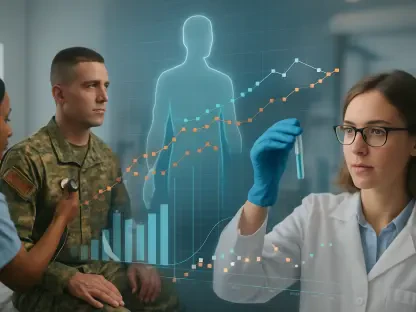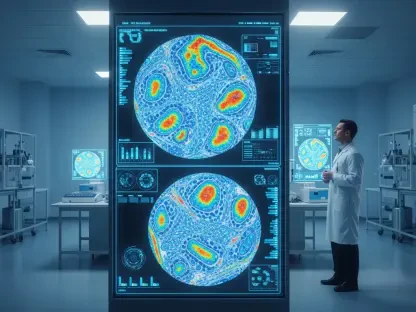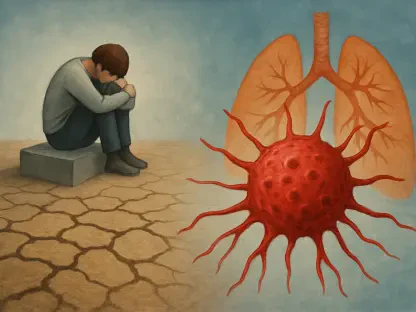In a groundbreaking endeavor to revolutionize cancer treatment, the University of California San Diego has embarked on a six-year initiative funded by a substantial contract awarded by the Advanced Research Projects Agency for Health (ARPA-H). This ambitious project, named “Dynamic Digital Tumors for Precision Oncology,” aims to significantly enhance the personalization of cancer therapy by employing artificial intelligence to create sophisticated Drug Recommender Engines. These AI-driven tools are set to redefine cancer care by predicting how specific therapies will affect tumor behavior and enabling clinicians to make more informed and effective treatment decisions. By addressing the unique challenges posed by complex cancers like breast, lung, and colorectal, which impact over 500,000 patients in the United States, this initiative seeks to consider various intricate biological, environmental, and genetic elements unique to each patient’s tumor.
Collaborative Efforts in Precision Oncology
The Role of Drug Recommender Engines
The development of Drug Recommender Engines (DREs) is central to this AI-driven initiative, promising to transform the landscape of cancer treatment. These engines are designed to analyze vast amounts of patient data to predict treatment outcomes accurately. By leveraging continuous data updates, these tools can adapt in real-time to changes in a patient’s condition. This capability is invaluable in treating advanced cancers characterized by unpredictable and rapid evolution. The DREs aim to integrate seamlessly with clinical workflows, allowing clinicians to consider real-time insights into the most effective and personalized therapeutic strategies. This approach not only emphasizes the importance of precision medicine but also embodies a significant shift in treatment paradigms, underscoring a move towards highly individualized patient care.
Integration and Interdisciplinary Collaboration
UC San Diego’s initiative is marked by extensive interdisciplinary collaboration, drawing expertise from multiple esteemed institutions, including City of Hope, University of Washington, UC San Francisco, University of Minnesota, Unravel Genomics, and Serinus Biosciences. This collaborative network highlights the integrative approach necessary for advancing cancer treatment technology and the importance of shared resources and expertise. By combining efforts, these institutions leverage diverse perspectives and skills, enhancing the capability to address complex cancer challenges comprehensively. This multifaceted collaboration reflects the strategic emphasis on improving patient outcomes and highlights the project’s alignment with the broader ARPA-H ADAPT program—a strategic initiative aiming to push the boundaries of healthcare technology and oncology.
Advancements Through Real-Time Data
Clinical Trials and Data Utilization
The project extends its reach by incorporating clinical trials designed to test novel therapies, offering a practical path to assess the effectiveness of AI-driven recommendations in real-world scenarios. This aspect is crucial for validating the anticipated benefits of AI applications in oncology. The clinical trials are complemented by platforms ensuring robust, real-time data collection and analysis, which is instrumental in shaping dynamic treatment plans. Through the deployment of these advanced analytical tools, the initiative promises to offer insights that are grounded in current clinical practice, setting a new standard in how cancer treatments are assessed and implemented. Real-time data serves as a pivotal component, facilitating immediate adaptations and adjustments to treatment courses, thereby improving the potential for successful patient outcomes.
Impact on the Healthcare System
The integration of artificial intelligence in oncology has profound implications for the healthcare system. By fostering a more precise understanding of cancer biology and response to treatment, the initiative aims to reduce instances of ineffective therapies, thus enhancing patient safety and lowering healthcare costs. The ripple effect of improved patient outcomes extends beyond individual cases, potentially leading to broader societal impacts, including enhanced public health metrics and reduced healthcare resource strain. Additionally, through its innovative framework, this project stands to set a benchmark in medical research and application, demonstrating the efficacy of harnessing advanced technologies to solve long-standing medical challenges.
Shaping the Future of Cancer Treatment
Integrating artificial intelligence into oncology has significant implications for the healthcare system. By facilitating a more accurate grasp of cancer biology and how it responds to treatment, this initiative seeks to reduce the frequency of ineffective therapies, improving patient safety and reducing healthcare expenses. The benefits of better patient outcomes ripple beyond individual treatment, potentially leading to broader societal changes, such as improved public health figures and less strain on healthcare resources. In addition, the innovative approach of this project has the potential to establish new standards in medical research and application. By demonstrating the effectiveness of cutting-edge technology to tackle persistent medical issues, it highlights the transformative power of AI in the medical field. The project not only aims to enhance clinical results but also to inspire changes in healthcare policies and practices. It marks a pivotal step towards a future where AI-driven precision medicine is integral to dealing with complex diseases like cancer.









